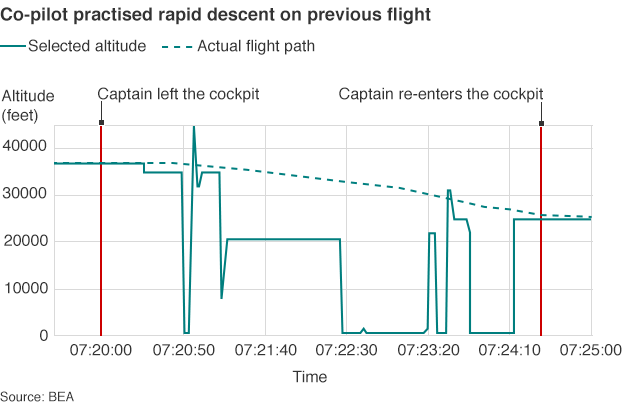Pilot practiced for that Alps crash on the previous flight
Passengers noticed nothing out of the ordinary, but Alps-crash copilot Andreas Lubitz had practiced his descent-programming skills on the previous flight.
He apparently waited until the pilot had stepped out of the cabin for a few minutes, and then he set about his business:
Over the course of three or four minutes, Lubitz…designate[d] “100 feet” as the selected flight level. He did this several times, while the pilot was out of the cockpit.
But this was just after the plane had already begun its descent. After each occasion that he chose “100 feet” he then corrected himself and entered the correct flight level. The course of the plane was not altered at all.
So no one noticed at all. Here’s how it went:
The article speculates that, although it’s unknown what was in Lubitz’s mind at that point, he seems like a “man steeling himself for the challenge he has set himself, building up the courage but at each point pulling back – until finally the pilot re-enters the cockpit and normality returns.”
Perhaps. But my theory is that he may have been purposely desensitizing himself to the act of setting the altitude so that it became more and more routine, as well as testing whether he could get away with it. By the time he decided to follow through on the return flight, he was calm, collected, and ready.
And those people who were on that outbound Germanwings flight that left Duesseldorf at 06:01, arriving in Barcelona at 07:57 on the 24th of March, 2015, can thank their lucky stars that it seemed to be—and functioned as—an ordinary, uneventful trip. But now they know what was actually happening.
[NOTE: At the end of the article is the following:
Were you on the outbound Duesseldorf to Barcelona flight in March? Have you been affected by the issues raised in this story? You can email haveyoursay@bbc.co.ukwith your comments.
I would be very interested in reading any of the responses.]


I read that all but 5-7 min of a flight are usually on auto pilot. If you think about the causes of airplane accidents my bet most are caused by human error and sabotage. A smaller number are due to weather or mechanical problems. If we eliminate pilot error (automate the 5-7 min) would the number of accidents go down?
I don’t know, anyone that works with computers knows how flaky they can be, especially when trying to make them do something they were designed to prevent. If he was even playing around with the settings this way, I’d assume he had already fully steeled himself and was repeatedly trying to find a way to make the plane ditch in the ocean. It didn’t work, but he didn’t get caught either, and was able to repeat the process when flying over land with a much higher elevation, where he was successful.
I’m betting that he wasn’t practicing, but trying to do it, and losing his nerve.
Mrs Whatsit:
Well, we’ll never know. But that’s not my hunch. He never even lets the plane change course or drop at all (except for following the pre-programmed slow descent). Seems to me that if he kept getting cold feet, at some point he would have at least let the plane drop a little bit extra (the pilot, outside of the cockpit at the time, would never have detected it, either, as long as the drop wasn’t drastic).
Whereas just a couple of hours later he doesn’t falter at all—the plane just goes down down down and crashes. No attempt to pull up, not a word said in the cockpit so that the flight recorder can record it, nothing. Nada. I think he had no intention of crashing the first plane and every intention of crashing the second.
But of course, as I said, one can’t know.
You’re right, we can’t know — and I didn’t realize the two flights were only a few hours apart, which does support your interpretation. It’s a mystery.
Also mystifying is how he managed to keep so calm when he did finally put the plane into its descent — the initial reports, at least, were that his breathing was audible and remained steady throughout, even when the pilot could be heard banging on the cabin door and passengers were screaming, even when the ground was coming right up at him. No matter how disturbed and suicidal he was, I find that impossible to understand. Drugs?
It’s called conditioning and focus. Something he put himself through.
Plus, he didn’t lock out the pilot the 1st time, but did the 2nd time.
I would be betting that he thought there might be some sort of alarm that might go off if you entered an impossible flight path, and was testing the system. What with things like stall warning stick shakers and aircraft collision alerts, he might have wanted to test the water in a deniable way, before committing fully.